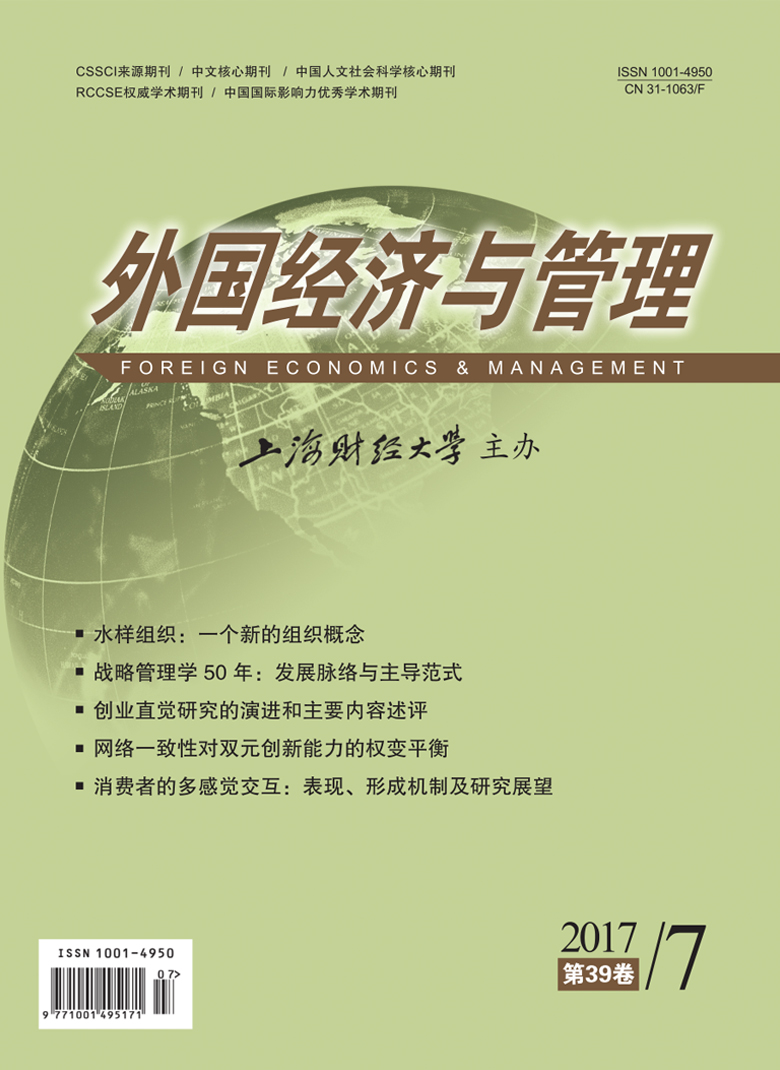创业直觉以无意识、迅速、整体关联以及情境依赖为特征。创业直觉的研究才刚刚起步且很不成熟。本文从当代直觉研究切入,进入创业直觉研究,概述创业警觉到创业直觉概念的演进,探究影响创业直觉的六个前置因素,然后从创业过程、创业者、企业三个层面分析创业直觉的后果,继而从认知续线体、双重过程观、经验推断三个理论构面综合探讨直觉判断与分析判断在决策特别是创业决策中的作用。由于创业直觉判断和创业机会密切关联,最后从创业机会内涵深入剖析切入,对文章内容进行了总结评价和进一步的解释。
创业直觉研究的演进和主要内容述评
摘要
参考文献
1 Akinci C, Sadler-Smith E. Intuition in management research: A historical review[J]. International Journal of Management Reviews, 2012, 14(1): 104–122. DOI:10.1111/ijmr.2012.14.issue-1
2 Allinson C W, Hayes J. The cognitive style index: A measure of intuition-analysis for organizational research[J]. Journal of Management Studies, 1996, 33(1): 119–135. DOI:10.1111/joms.1996.33.issue-1
3 Baldacchino L, Ucbasaran D, Cabantous L, et al. Entrepreneurship research on intuition: A critical analysis and research agenda[J]. International Journal of Management Reviews, 2015, 17(2): 212–231. DOI:10.1111/ijmr.2015.17.issue-2
4 Baron R A. Opportunity recognition as pattern recognition: How entrepreneurs " connect the dots” to identify new business opportunities[J]. Academy of Management Perspectives, 2006, 20(1): 104–119. DOI:10.5465/AMP.2006.19873412
5 Baron R A, Ensley M D. Opportunity recognition as the detection of meaningful patterns: Evidence from comparisons of novice and experienced entrepreneurs[J]. Management Science, 2006, 52(9): 1331–1344. DOI:10.1287/mnsc.1060.0538
6 Betsch T, Glöckner A. Intuition in judgment and decision making: Extensive thinking without effort[J]. Psychological Inquiry, 2010, 21(4): 279–294. DOI:10.1080/1047840X.2010.517737
7 Blume B D, Covin J G. Attributions to intuition in the venture founding process: Do entrepreneurs actually use intuition or just say that they do?[J]. Journal of Business Venturing, 2011, 26(1): 137–151. DOI:10.1016/j.jbusvent.2009.04.002
8 Brigham K H, De Castro J O, Shepherd D A. A person-organization fit model of owner-managers’ cognitive style and organizational demands[J]. Entrepreneurship Theory and Practice, 2007, 31(1): 29–51. DOI:10.1111/etap.2007.31.issue-1
9 Chaston I, Sadler-Smith E. Entrepreneurial cognition, entrepreneurial orientation and firm capability in the creative industries[J]. British Journal of Management, 2012, 23(3): 415–432.
10 Cossette P. Heuristics and cognitive biases in entrepreneurs: A review of the research[J]. Journal of Small Business & Entrepreneurship, 2014, 27(5): 471–496.
11 Cropley A. In praise of convergent thinking[J]. Creativity research journal, 2006, 18(3): 391–404. DOI:10.1207/s15326934crj1803_13
12 Dane E, Pratt M G. Exploring intuition and its role in managerial decision making[J]. Academy of Management Review, 2007, 32(1): 33–54. DOI:10.5465/AMR.2007.23463682
13 Dayan M, Elbanna S. Antecedents of team intuition and its impact on the success of new product development projects[J]. Journal of Product Innovation Management, 2011, 28(s1): 159–174. DOI:10.1111/j.1540-5885.2011.00868.x
14 Dimov D. From opportunity insight to opportunity intention: The importance of person-situation learning match[J]. Entrepreneurship Theory and Practice, 2007a, 31(4): 561–583. DOI:10.1111/etap.2007.31.issue-4
15 Dimov D. Beyond the single-person, single-insight attribution in understanding entrepreneurial opportunities[J]. Entrepreneurship Theory and Practice, 2007b, 31(5): 713–731. DOI:10.1111/etap.2007.31.issue-5
16 Dutta D K, Crossan M M. The nature of entrepreneurial opportunities: Understanding the process using the 4I organizational learning framework[J]. Entrepreneurship Theory and Practice, 2005, 29(4): 425–449. DOI:10.1111/etap.2005.29.issue-4
17 Dutta D K, Thornhill S. The evolution of growth intentions: Toward a cognition-based model[J]. Journal of Business Venturing, 2008, 23(3): 307–332. DOI:10.1016/j.jbusvent.2007.02.003
18 Eisenhardt K M. Making fast strategic decisions in high-velocity environments[J]. Academy of Management journal, 1989, 32(3): 543–576. DOI:10.2307/256434
19 Eisenhardt K M, Tabrizi B N. Accelerating adaptive processes: Product innovation in the global computer industry[J]. Administrative Science Quarterly, 1995, 40(1): 84–110. DOI:10.2307/2393701
20 Epstein S. Demystifying intuition: What it is, what it does, and how it does it[J]. Psychological Inquiry, 2010, 21(4): 295–312. DOI:10.1080/1047840X.2010.523875
21 Epstein S, Pacini R, Denes-Raj V, et al. Individual differences in intuitive–experiential and analytical–rational thinking styles[J]. Journal of Personality and Social Psychology, 1996, 71(2): 390–405. DOI:10.1037/0022-3514.71.2.390
22 Evans J S B T, Stanovich K E. Dual-process theories of higher cognition: Advancing the debate[J]. Perspectives on Psychological Science, 2013, 8(3): 223–241. DOI:10.1177/1745691612460685
23 Finucane M L, Alhakami A, Slovic P, et al. The affect heuristic in judgments of risks and benefits[J]. Journal of behavioral decision making, 2000, 13(1): 1–17. DOI:10.1002/(ISSN)1099-0771
24 Grégoire D A, Barr P S, Shepherd D A. Cognitive processes of opportunity recognition: The role of structural alignment[J]. Organization Science, 2010, 21(2): 413–431. DOI:10.1287/orsc.1090.0462
25 Hodgkinson G P, Sadler-Smith E, Burkeet L A, al. Intuition in organizations: Implications for strategic management[J]. Long Range Planning, 2009, 42(3): 277–297. DOI:10.1016/j.lrp.2009.05.003
26 Hogarth R M. Intuition: A challenge for psychological research on decision making[J]. Psychological Inquiry, 2010, 21(4): 338–353. DOI:10.1080/1047840X.2010.520260
27 Kahneman D, Klein G. Conditions for intuitive expertise: A failure to disagree[J]. American Psychologist, 2009, 64(6): 515–526. DOI:10.1037/a0016755
28 Kickul J, Gundry L K, Barbosa S D, et al. Intuition versus analysis? Testing differential models of cognitive style on entrepreneurial self-efficacy and the new venture creation process[J]. Entrepreneurship Theory and Practice, 2009, 33(2): 439–453. DOI:10.1111/etap.2009.33.issue-2
29 Kirzner I M. The alert and creative entrepreneur: A clarification[J]. Small Business Economics, 2009, 32(2): 145–152. DOI:10.1007/s11187-008-9153-7
30 Linton J D, Walsh S T. Acceleration and extension of opportunity recognition for nanotechnologies and other emerging technologies[J]. International Small Business Journal, 2008, 26(1): 83–99. DOI:10.1177/0266242607084660
31 Mitchell J R, Friga P N, Mitchell R K. Untangling the intuition mess: Intuition as a construct in entrepreneurship research[J]. Entrepreneurship Theory and Practice, 2005, 29(6): 653–679. DOI:10.1111/(ISSN)1540-6520
32 Read S, Dew N, Sarasvathy S D, et al. Marketing under uncertainty: The logic of an effectual approach[J]. Journal of Marketing, 2009, 73(3): 1–18. DOI:10.1509/jmkg.73.3.1
33 Sadler-Smith E. The role of intuition in entrepreneurship and business venturing decisions[J]. European Journal of Work and Organizational Psychology, 2016, 25(2): 212–225. DOI:10.1080/1359432X.2015.1029046
34 Sinclair M. Misconceptions about intuition[J]. Psychological Inquiry, 2010, 21(4): 378–386. DOI:10.1080/1047840X.2010.523874
35 Tang J T, Kacmar K M, Busenitz L. Entrepreneurial alertness in the pursuit of new opportunities[J]. Journal of Business Venturing, 2012, 27(1): 77–94. DOI:10.1016/j.jbusvent.2010.07.001
36 Vaghely I P, Julien P A. Are opportunities recognized or constructed?: An information perspective on entrepreneurial opportunity identification[J]. Journal of Business Venturing, 2010, 25(1): 73–86. DOI:10.1016/j.jbusvent.2008.06.004
引用本文
方世建, 秦玲玲. 创业直觉研究的演进和主要内容述评[J]. 外国经济与管理, 2017, 39(7): 33–50.
导出参考文献,格式为:





 9267
9267  10383
10383

